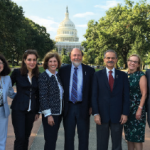Persistent Challenges
Sometimes the challenges seem neverending. In addition to the rigors of our daily lives as rheumatology health professionals—growing administrative burdens, increasing pressures to fund research and achieve balance in family and personal lives—we face a growing number of challenges related to the rapidly escalating prices of rheumatology treatments. Even more unfortunately, these costs increasingly affect the lives of patients with a wide range of rheumatic disease.
To control cost, insurance carriers, pharmacy benefit managers and government lawmakers have long placed restrictions on the care and treatment we provide. For years, they’ve imposed requirements for prior authorizations, step therapy and specialty tiering to limit the utilization of medicines. Recently, rheumatologists and other specialists who commonly prescribe expensive treatments have faced a new challenge that threatens the financial viability of practicing medicine: a threatened, large cut in reimbursement for Part B drugs in Medicare. Just last year, the rheumatology community joined with patients and other physician groups to stop the cuts. This year, our community is facing a similar threat that, if implemented, could force many rheumatologists to stop prescribing the Part B drugs that are so important to our patients.
A Troubling Diversion
Late in 2017, when it finalized its rule for how the Quality Payment Program set up by MACRA would operate in 2018 and beyond, the CMS announced that it will begin applying Merit-Based Incentive Payment System (MIPS) payment adjustments to the reimbursements providers receive for Part B drug costs in 2019. This position is a drastic departure from previous policy in which reimbursement adjustments only affected payments for physician services provided under Part B. This new approach is particularly exasperating because rheumatologists and other physicians do not control the pass-through costs associated with the Part B drugs they provide to patients.
The high cost of these specialty drugs is a significant problem, and the ACR has consistently advocated for such remedies as allowing Medicare to use its negotiating power to lower the price of drugs. Unfortunately, payers continue to adopt convoluted and increasingly indirect policies that frequently have disproportionate impact on small practices and unintended consequences for the cost and access for care for patients. In the instance of this policy, according to a troubling analysis from Avalere Health, some specialists could see payment cuts as high as 29% by 2020 if Part B drug costs are included in quality-program payment adjustments.
The prospect of such a dramatic payment swing could force those who provide in-office treatments into the impossible position of deciding whether to stop providing critical treatments to patients or alter treatment plans for patients who are currently stable—putting the patient’s health and safety at risk—or jeopardize the operational viability of their practice. We see it as an extreme disincentive for rheumatologists, particularly those in small practices and in rural settings, to provide Part B drugs in the office. This situation has the potential to create a dire patient access situation, because when patients cannot receive their treatment in their doctor’s office, they may not have other choices available, or the alternatives may require long drives or higher costs. Patients are already facing access challenges, because the budget sequester has eroded reimbursements to physicians and this policy would exacerbate these problems.
The ACR Takes Action
When the CMS proposed this new policy to adjust payment based on Part B drug costs, the ACR began a multipronged advocacy campaign. I and other members of the ACR Executive Committee met with Senate and House committee staff, the ACR met with Medicare leaders and sent official comment letters, and after you, our members, sent hundreds of letters to Congress, bipartisan groups of lawmakers from both chambers sent letters to CMS urging them to change the proposal. We also authored and successfully passed a resolution at the AMA House of Delegates that ensures the AMA will advocate against such policies, and we had several other physician specialties and state medical societies sign on to join our effort.
Despite those initial efforts, the CMS finalized the new plan to include Part B drug costs in reimbursement adjustments. It, thus, became clear that Congress must act to fix the policy by making a legislative clarification that MIPS bonus and penalty adjustments should not be applied to Part B drug payments. The ACR has renewed its push by organizing a comprehensive strategy to get this done. We immediately organized a sign-on letter to Congress from 14 physician specialties, created a coalition of similarly minded specialties and again met with members of Congress. To magnify our voice, the ACR placed an op-ed written by me and the president of the American Academy of Ophthalmology in a prominent Washington, D.C., publication read by key congressional influencers.
We are also partnering with patient groups—who have many patient advocates who are eager to get involved in these causes—not just from rheumatology but from across all of the affected conditions, along with state and local rheumatology societies, into a broad coalition working to remedy this new and dangerous policy. The latest coalition letter organized by the ACR drew support from 109 physician and patient groups from across the spectrum of the impacted specialties. Although many are getting involved on an organizational level, to be successful, lawmakers must take action, which means they first need to hear from you—their constituent.
Everyone Can Do Something
With continual challenges comes the need for continual advocacy on the part of the ACR, and we need you and every other member of the ACR and ARHP to be a part of this on behalf of your patients.
Because of our expertise with targeted therapies and understanding of the impact of these medications on the lives of patients with many chronic diseases, rheumatologists and rheumatology health professionals are uniquely positioned and qualified to inform policymakers and to stand up for patients’ needs and the rheumatology subspecialty, and to educate policymakers about best policies. Who else but us?
Everyone can do something. Maybe you’d like to do something quick like sending a pre-filled email to your lawmakers through the ACR Legislative Action Center at rheumatology.org/Advocacy/Legislative-Action-Center. Or maybe you prefer to help by investing in RheumPAC and perhaps even attending a RheumPAC-sponsored event that will allow you to talk with an elected official about the challenges you are facing in your practice. You can even get your patients involved if they are affected and have an interest in advocacy.
To fix our current and future problems, it will take all of us pulling together to protect our patients and our specialty. Thank you to all members of the ACR and ARHP who regularly take action on behalf of your patients. To those who have not had the chance to do so in the past, I welcome and encourage your involvement in advocacy in whatever way works best for you. Visit www.rheumatology.org/advocacy to get started.
All of our individual contributions add up, and together we can make a difference.
David Daikh, MD, PhD, is the 81st president of the ACR. Dr. Daikh serves as the director of the Rheumatology Fellowship Training Program at the University of California, San Francisco and as chief of the Rheumatology Division at the SFVA Medical Center, where he directs the Rheumatology Clinic.
Late-Breaking News
Editor’s note: Congress responded to this ACR advocacy campaign by including a fix to the Part B rule in a continuing resolution. As we go to press, it was being considered for passage. The ACR thanks members who contacted lawmakers, helping make this happen.


